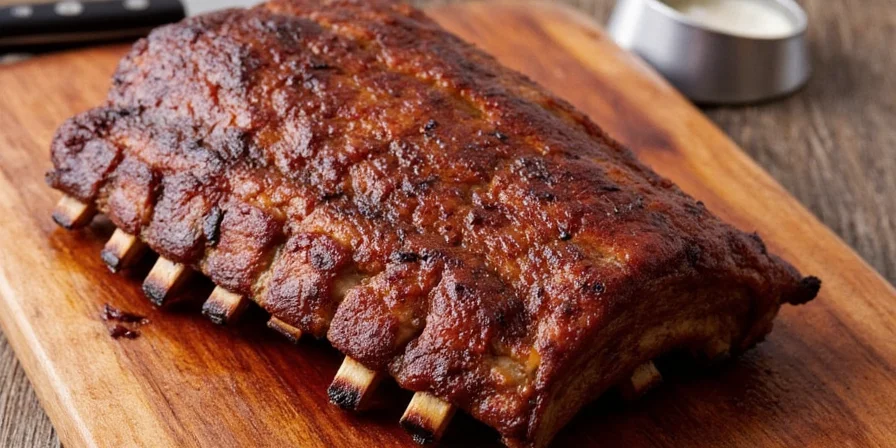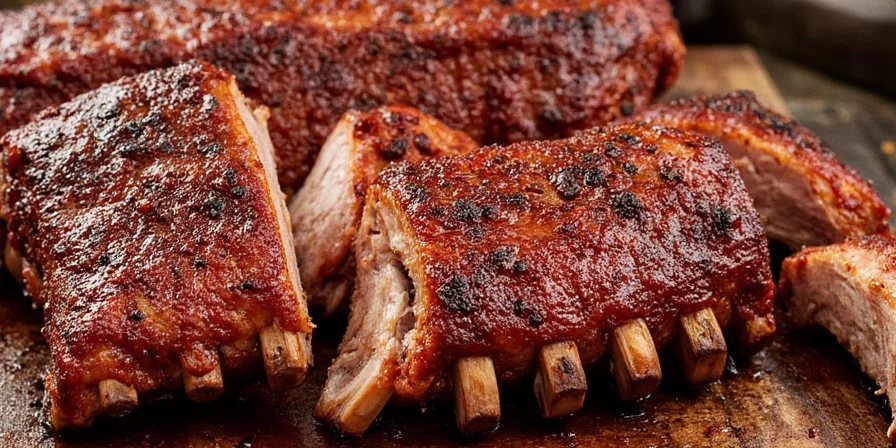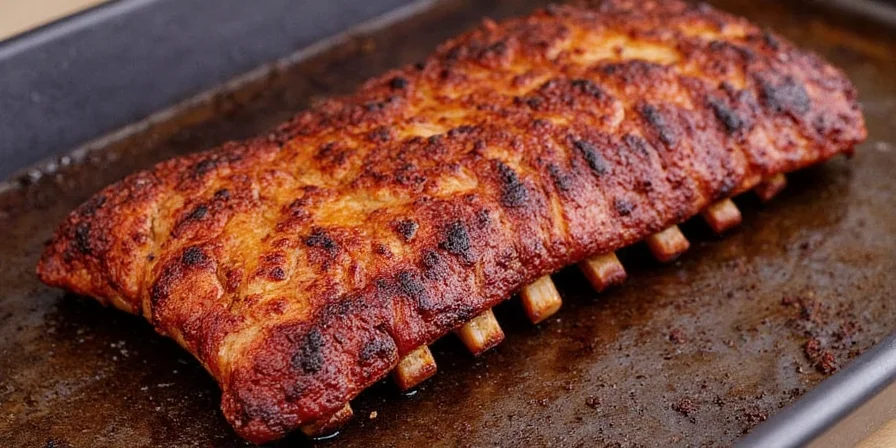Unlocking Flavor: The Secret Spice Behind Perfect Slow-Cooked Ribs

Whether you're a seasoned chef or just starting your culinary journey, the right spice can elevate a dish from “meh” to “unforgettable.” When it comes to slow-cooked ribs, there's one spice that stands out — mustard powder. Often overlooked, this golden-yellow powder is a powerhouse in flavor and texture. In this blog, we’ll dive into the world of spice storage and usage hacks, focusing specifically on mustard powder and how to use it like a pro in your slow-cooked ribs recipe.
Why Mustard Powder is a Game-Changer for Slow-Cooked Ribs
Mustard powder might not be the first spice that comes to mind when you think of ribs, but it brings a unique depth of flavor that complements the richness of the meat. It adds a subtle tang that balances the fattiness of the ribs and enhances the other spices used in the rub. Plus, it helps in forming a perfect crust when applied before roasting or baking.
Now that we know why mustard powder is a must-have, let's explore the best ways to store and use it to ensure you get the most out of every jar.
Pro Tips for Storing Mustard Powder
- Keep it in a cool, dark place: Exposure to light and heat can cause mustard powder to lose its potency. Store it in a pantry or a spice drawer away from the stove and sunlight.
- Use airtight containers: Mustard powder is prone to moisture and oxidation. Transfer it to an airtight container to maintain its freshness and flavor.
- Label and date: If you have multiple jars of different spices, labeling and dating your mustard powder helps you keep track of its shelf life and ensures you’re always using the freshest batch.
How to Use Mustard Powder in Slow-Cooked Ribs
Now that we’ve covered storage, let’s move on to the fun part — using mustard powder in your slow-cooked ribs. Here are a few techniques to make the most out of this versatile spice:
- Make a dry rub: Combine mustard powder with brown sugar, paprika, garlic powder, and salt. Rub this mixture over the ribs before cooking to create a flavorful crust that caramelizes beautifully in the oven.
- Use as a marinade booster: If you're marinating your ribs before slow cooking, add a teaspoon of mustard powder to your marinade. It helps tenderize the meat and adds a subtle kick of flavor.
- Blend into a sauce: After slow cooking, mix mustard powder with some of the drippings from the ribs to create a rich, tangy sauce that pairs perfectly with the meat.
The Science Behind Mustard Powder and Flavor
Mustard powder is made from ground mustard seeds, which contain compounds like sinigrin and glucosinolates. These compounds are responsible for the sharp, pungent flavor of mustard and also have antimicrobial properties, which can help preserve the meat during slow cooking.
When you apply mustard powder to meat, it reacts with the proteins in the meat, causing a Maillard reaction — the same chemical process that gives grilled meat its delicious crust. This not only enhances the flavor but also improves the texture of the ribs, making them more tender and juicy.
Here's a quick breakdown of how mustard powder affects the cooking process:
| Effect | Description |
|---|---|
| Flavor Enhancement | Mustard powder adds a tangy, slightly sweet flavor that complements the richness of the ribs. |
| Texture Improvement | It helps form a caramelized crust during cooking, adding a layer of complexity to the dish. |
| Tenderizing | The enzymes in mustard powder help break down the collagen in the meat, making it more tender and juicy. |
Spice Storage Hacks for All Your Kitchen Essentials
Now that we’ve covered mustard powder, let’s expand our knowledge to other spices and how to store them for maximum freshness and flavor. Here are some essential spice storage hacks that every serious cook should know:
1. Use Glass Jars for Maximum Freshness
Plastic containers may seem convenient, but they can absorb odors and moisture over time. Glass jars are airtight, non-reactive, and perfect for storing spices like mustard powder, paprika, and cumin.
2. Keep Spices Away from Heat and Light
Spices are sensitive to heat and light, which can cause them to lose their potency and flavor. Store them in a cool, dark place like a pantry or a spice cabinet.
3. Avoid Moisture at All Costs
Moisture is the enemy of spices. If your spices are exposed to humidity, they can clump, lose flavor, or even grow mold. Make sure your containers are airtight and keep them away from the sink and stove.
4. Use Spices Within Their Shelf Life
Most spices have a shelf life of 6–12 months. After that, they start to lose flavor. Label your jars with the date you opened them, and use the oldest spices first.
5. Grind Whole Spices for Maximum Flavor
If you have whole spices like cinnamon sticks or peppercorns, it's best to grind them just before use. This preserves their oils and enhances their flavor.
Why Mustard Powder is a Hidden Gem in the Kitchen
Mustard powder may not be as flashy as cumin or paprika, but it’s a versatile and powerful spice that can transform your slow-cooked ribs into a culinary masterpiece. Its ability to enhance flavor, improve texture, and even tenderize meat makes it a must-have in any spice rack.
By storing it properly and using it creatively, you can take your cooking to the next level. Whether you're making ribs, roasting vegetables, or whipping up a sauce, mustard powder is a flavor booster that should not be overlooked.
Final Thoughts: Master the Art of Spice Storage and Usage
Spices are the unsung heroes of the kitchen. They can elevate a simple dish or ruin it in an instant. With the right storage techniques and usage hacks, you can ensure that every spice in your kitchen is at its peak flavor and potency.
Mustard powder is just one example of how a little-known spice can make a big difference. Whether you're slow-cooking ribs, making a sauce, or experimenting with new recipes, the key is to treat your spices with care and respect.
So, next time you're in the kitchen, take a moment to appreciate the power of mustard powder — and the other spices that make your cooking so much better. Happy cooking!

Remember, the secret to great cooking lies in the details — and that includes how you store and use your spices.
Further Reading (without links)
- How to Make the Perfect Dry Rub for Ribs
- The Science of Maillard Reaction in Cooking
- 5 Essential Spices Every Chef Should Have
Whether you're a professional cook or a home chef, mastering spice storage and usage is a skill that can elevate your cooking to new heights. Take the time to learn, experiment, and most importantly — enjoy the process!
With the right knowledge and a little practice, you'll be on your way to creating dishes that are not only delicious but also bursting with flavor.
So go ahead, grab that jar of mustard powder, and let it work its magic in your next batch of slow-cooked ribs. Your taste buds will thank you.

Remember, the right storage makes all the difference in your spice game.
Happy cooking, and may your ribs always be tender, juicy, and full of flavor!










 浙公网安备
33010002000092号
浙公网安备
33010002000092号 浙B2-20120091-4
浙B2-20120091-4